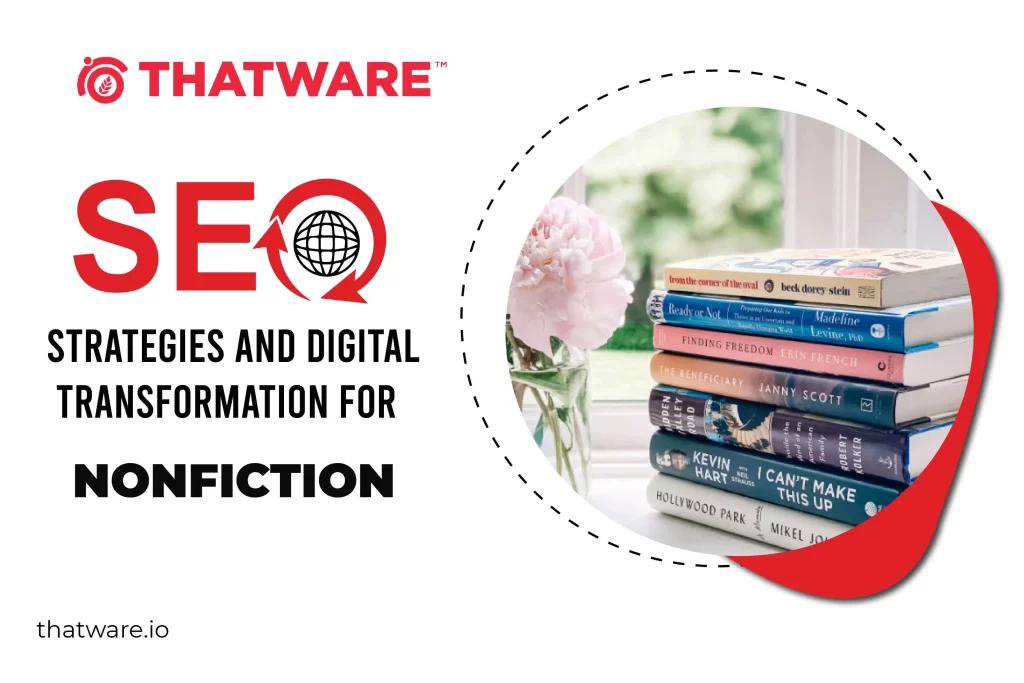Suppose you’ve written and published your first nonfiction book, congratulations! You’re on the path to sharing your expertise with the world, reaching new audiences and possibly even making money. But there are many different ways to publish and promote a book, and some strategies are more likely to result in more people reading your book than others. In this article, we’ll share tips to help you optimize your book so that search engines like Google and Bing can find it easily and spread the word to potential readers.
Here are some Fascinating Tips For Optimizing Your Nonfiction Book For Search Engines and digital growth strategy for nonfiction book.
They are:
- Research your keywords thoroughly.
- Write a Compelling Title That Incorporates Keywords.
- Write an Engaging Meta Description
- Create an XML Sitemap
- Use Google Authorship.
- Promote Your Book Online
Let’s discuss all of the above points and how can digital transformation strategy for nonfiction book help.
Research your keywords thoroughly
Researching keywords is one of the most important steps to optimizing your book for search engines. If you are aware of what people are searching for and want to find your book, then it’s a good idea to make sure that the words and phrases in your title, subtitle, author name, cover page, blurb, and other places are relevant to what they’re looking for. It also helps if you make use of keywords throughout the body of your text as well. It can make a big difference regarding visibility on Amazon or in Google searches.
Write a Compelling Title That Incorporates Keywords.
It is your responsibility to optimize your book for search engines. The good news is that it doesn’t take much time or cost much money to do this. This blog post will provide simple tips for optimizing your nonfiction book.
-Use Keywords: Make sure to use keywords in the title, subtitle, and throughout the text of your book. -Include a Table of Contents: Include a table of contents so that people can find information quickly on specific topics in your book. -Create an Index: Create an index in the back of your book so that readers can look up keywords and find where they are mentioned in the text.
Write an Engaging Meta Description
Here are some ways to optimize your nonfiction book for search engines.
1. Write a well-written keyword-dense description of your book that is at least 150 words long and has a call to action in the last sentence.
2. In the back matter, include keywords related to your book’s content on the copyright page, dedication page, and acknowledgments page.
3. Include keywords in all headings throughout your book (e.g., Introduction, Chapter 1, etc.).
4. Make sure you have at most five or six headings per chapter. Each heading should have only one subheading unless there is an extenuating circumstance like space constraints or repetition of concepts between chapters. 5. When possible, find synonyms for popular keywords so that you can be found when someone searches for those synonyms instead of just using the keyword as it’s written. For example:
6. Don’t use any filler words like a, and, or but when describing your book because these will distract from what it is about without adding anything substantive.
A strong and authentic meta description can increase your organic search results’ click-through rate. It means that more searchers who view your page in the results will click through and visit your website. Even if your rating doesn’t change, you will receive extra visitors!
Create an XML Sitemap
A sitemap is the list of all the pages on your website in a particular order, indicating which page should be indexed by search engines. Creating a sitemap will help you optimize your site and make it easier for visitors to find the content they want. It also allows search engine crawlers (programs that index and rank websites) to easily find all the site’s pages. So, creating an XML Sitemap is important when publishing your nonfiction books.
Use Google Authorship
1) Update your Google+ Profile with an image of the cover of your book.
2) Link to your Google+ Profile from the author bio on your blog, website or any other social media platform where you promote your book.
3) Add a link to your Google+ Profile at the back of your book.
4) Use keywords in your book’s title and subtitle that are also used in search queries.
5) Include keywords in the first sentence of each chapter, as well as headings and subheadings throughout the text.
Promote your book online
Promoting your book online is a great way to get the word out about your work. Here are some easy ways to optimize your nonfiction book for search engines:
1) Use keywords in your title and throughout the book’s text. 2) Make sure that the text on your pages is readable by humans and search engine robots by avoiding hidden text, scripts, and code. 3) Include a link to an online store where readers can buy a copy of your book with each ebook or print edition page. 4) Link from any related social media accounts such as Facebook and Twitter. 5) Include links from other sites relevant to yours, such as blog posts or professional websites.
Get the benefit of business growth strategy for nonfiction book.
